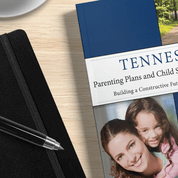Court Can Modify Parenting Time Despite Failure to File Proposed Plan
- At February 05, 2019
- By Miles Mason
- In Child Custody
 0
0
Tennessee child custody modification case summary.

Tennessee Parenting Plans book by Miles Mason, Sr. available on Amazon
Travis Daniel Freeman v. Wendy Y. Freeman
The mother and father in this case were divorced in Meigs County, Tennessee, in 2013. The court’s judgment included a permanent parenting plan for their child. The mother was named the primary residential parent, with the father having supervised visitation for two hours each Saturday. The order specified that the father could request additional parenting time by a letter to the mother’s attorney. If this request was denied, the father was allowed to file a petition.
Several months later, the father filed a petition to modify. His petition included a proposed parenting plan, as required by the relevant Tennessee statute. Under his proposed plan, the father would have the child every weekend, with additional time in the summer.
The trial court partially granted this request, allowing unsupervised visitation for nine hours each Saturday. The order also stated that the father could petition again after one year.
Before the one-year period had elapsed, the father filed another motion, which the trial court granted. The father was granted visitation on both Saturdays and Sundays.
In 2017, the father filed another motion, which was heard by Judge Casey Mark Stokes. The trial court ordered a new parenting plan granting further parenting time to the father. The mother then appealed to the Tennessee Court of Appeals.
The mother argued on appeal that the lower court lacked subject matter jurisdiction, because the father’s last petition failed to include a proposed parenting plan. Including such a plan is required by the relevant Tennessee statute.
The appeals court first noted that Tennessee courts generally have continuing subject matter jurisdiction over divorce cases to adjudicate post-divorce custody issues. Here, the appeals court ruled that the father had properly invoked jurisdiction with his first petition, even though the final petition did not comply fully with the statute.
The appeals court did agree with the mother that the proposed plan should have been attached. The earlier judgments were final judgments, and in such a situation, the statute calls for the plan to be filed.
But the court went on to cite an earlier case holding that the failure to include the plan does not mean that subject matter jurisdiction is lacking. It re-affirmed the ruling in that case.
For these reasons, the Court of Appeals affirmed the lower court’s judgment.
No. E2017-02110-COA-R3-CV (Tenn. Ct. App. Dec. 14, 2018).
See original opinion for exact language. Legal citations omitted.
To learn more, see Modifying Custody & Parenting Plans.
See also Tennessee Parenting Plans and Child Support Worksheets: Building a Constructive Future for Your Family featuring examples of parenting plans and child support worksheets from real cases available on Amazon.com.









